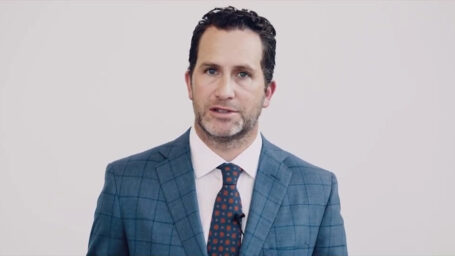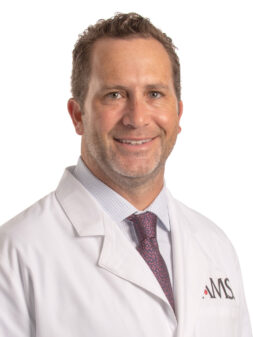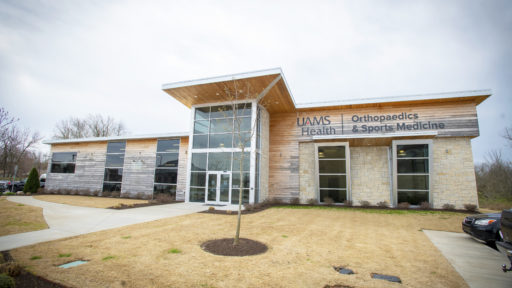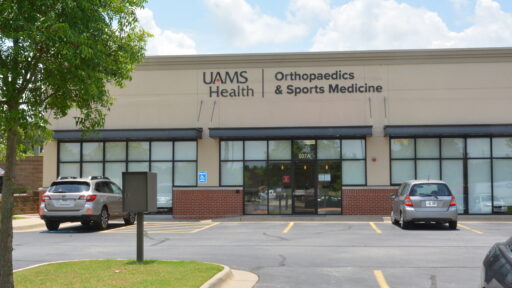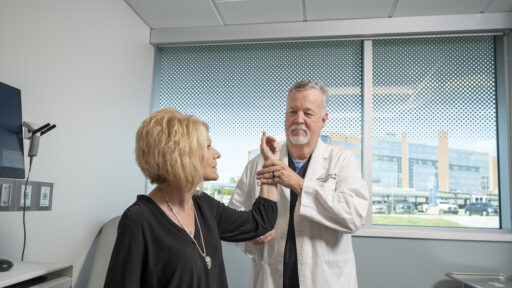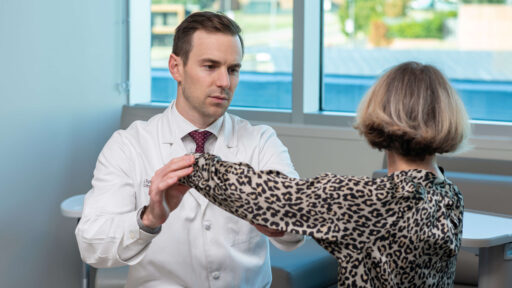Description
Wesley K. Cox, M.D., an orthopaedic surgeon with UAMS Health, gives information about shoulder replacements.
Video Player
Transcript
Shoulder arthritis is one of the most common things that i see patients for. It’s a substantial part of my practice.
All shoulder arthritis isn’t created equal. Some arthritis — rheumatoid arthritis, psoriatic arthritis —there are a variety of arthritic processes that you get from some sort of immunologic issue or rheumatologic disease. Then there’s traumatic arthritis that you get from either recurrent dislocations when you were playing college football or a bad bike wreck when you were 35 or something that then 25, 30, 40 years later, you’re now dealing with a shoulder that just doesn’t move right.
There are some conditions — although fairly uncommon, we see a lot of it here, because it’s what we do — but there are some conditions where very young patients will get arthritis, as well. And fortunately, our ability to address that is getting better and better as science and technology have continued to sort of catch up.
Shoulder replacement is a wonderful procedure for the right person. When done for the right reasons and the right person, 95 percent of people get 100 percent pain relief. That’s been shown nationally. The key is: who is the right person? Because there are certain activity levels where certain types of shoulder replacements are not ideal. There are certain types of shoulder replacements where you can do whatever you want with those shoulder replacements. Figuring out what’s right for the patient is number one.
Number two is matching that with their lifestyle. So whether you’re a 44-year-old competitive weightlifter with an arthritic shoulder, that difference is that treatment is going to be very different than an 83-year-old grandmother or a 91-year-old farmer. I’ve told 52-year-old patients that I didn’t think they were healthy enough for surgery. We’ve done shoulder replacements in much older folks who couldn’t get in out of their tractor after their 90th birthday, but that was very important to them.
So giving people the ability to do the things they want to do with the shoulder replacement is a lot of fun. It’s one of the few procedures we do in orthopedics where you wake up fixed, where you wake up without the thing you went to sleep with for surgery. So the recovery from a shoulder replacement is very different than sewing tendons down, fixing broken bones, because we’re not typically waiting on anything to heal. There’s some time in a sling while we will let the shoulder recover, but as far as feeling better, it’s almost immediate. I had a patient four or five years ago that said it best. He said — this is the morning after surgery — he said, “I feel like I’ve been going to work in a warehouse every day and there was a loud fan on, and today, the fan wasn’t on.” And that’s how i would describe it, that this background noise that patients with arthritic shoulders get used to is eliminated. For 95 percent of people, their shoulder never hurts them again.
Making sure that you get the treatment that’s appropriate for you and that will meet your expectations is a conversation. It’s a conversation about exactly what’s wrong with you. Do you have a rotator cuff? Do you not have a rotator cuff?
What we call anatomical total shoulder replacement is for patients whose rotator cuff is normal. The rotator cuff has some very specific roles in the shoulder. If you have a worn-out ball and socket and your rotator cuff is okay, then, generally speaking, we can replace that ball and socket like a hip replacement or like a knee replacement and have new bearing surfaces, so the bone never touches bone again. Unlike a hip or knee, I sort of joke with patients, you don’t have to walk on it.
The recovery right out of the gate is very different. Our patients typically spend one night in the hospital with a shoulder replacement and go home the next day. It’s rare to require blood transfusions or anything like that. Not that it’s uneventful. I don’t mean to make light of it, because it’s a real surgery. But when you can take a severe amount of pain that a patient’s having and immediately get rid of it, that recovery is very swift, faster even than our patients with rotator cuff tears, shoulder instabilities. Shoulder replacement patients typically take less narcotics than some of the simplest arthroscopic procedures that we do.
So an anatomic total shoulder [replacement] is where we give you a new ball and a new socket so that when the ball and socket are rubbing on each other — and this is how i just describe it to my patients — it’s smooth. What happens over time is, if you get a little arthritis on the ball, then that rough spot rubs on the socket. Now there’s a rough spot on the socket and it goes back and forth where you end up with a socket that’s not the way it once was, and a ball that’s not the way it once was, and you get two sort of squared off surfaces rubbing on each other. So as that progresses, then the amount of motion that people have gets less and less, the amount of pain they have with whatever motion they have increases to a point where you just can’t stand it anymore.
What i tell patients — if a surgeon ever tells you that you need a shoulder replacement, I’d look for another surgeon. I don’t tell my patients that. I don’t think any of us should. What we can offer, though, is a shoulder replacement for a patient who wants one and who meets criteria. So when all the ingredients are right — and that’s what we’ll figure out in the office — if the ingredients are right for you, then a shoulder replacement is a wonderful operation to get you back doing the things that you might have thought you couldn’t do anymore. Don’t settle for a shoulder that’s rough and makes noise and cracks and pops and hurts to move until you find out if you’re a candidate for a surgery that could address that.
Physical therapy, cortisone injections, acupuncture, chiropractic treatment — these are all things that we will throw at it first. So we continue to try to be as conservative as we can. Shoulder arthritis is no different than most of the conditions we treat in that, if we can win without surgery, we will. But fortunately, in this case, there’s a wonderful answer if the conservative treatments fail.

